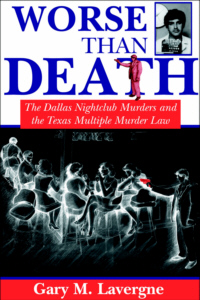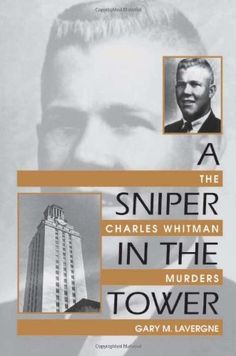
Celebrating Texas Writers Month with us today is Gary Lavergne (Austin).
Comment by May 25 to win a signed hardcover of Worse Than Death: The Dallas Nightclub Murders and the Texas Multiple Murder Law
or The History Channel DVD “True Crime Authors: A Sniper In The Tower”. Increase your chances of winning by subscribing to this blog through Feedburner. Giveaway for U.S. residents only.
Gary Lavergne just won the Carr P. Collins Award for Non-Fiction by the Texas Institute of Letters and the Coral Horton Tullis Prize for Best Book on Texas History by Texas State Historical Association.
Gary is a member of the Texas Institute of Letters and has appeared on DATELINE NBC, the Today Show, the History Channel, Biography, American Justice, and The Discovery Channel. He has been published in regional, national, and international scholarly journals. His award-winning book, A Sniper in the Tower: The Charles Whitman Murders, received rave reviews from best selling authors and many of the nation’s largest and most respected dailies and trade magazines. The Austin American-Statesman called Sniper the definitive account of the Texas Tower Tragedy.
Dan Rather of CBS News referred to Gary’s work as “classic crime reporting.”
Gary was also a featured author for Southern Scribe and the 1997, 1999, and 2003 Texas Book Festivals. He was also chosen to moderate sessions for the 2004 and 2009 festivals.
Today, Gary is the Director of Admissions Research and Policy Analysis in the Office of Admissions at The University of Texas at Austin. He is the author of numerous Admissions Research reports for the University of Texas. In March of 2001 he gained international attention with his New York Times Op-Ed piece entitled “Is This the End of the SAT?”
Q. Are you a native Texan or did you get here as soon as you could?
A. I am an authentic Cajun born and reared in Louisiana. After 13 years as a public school teacher and administrator I moved to Austin in 1989 to work for ACT, Inc., the college admissions test. In September of 2000 I became the Director of Admissions Research at The University of Texas at Austin.
Q. How did you end up writing nonfiction?
A. My job with ACT required extensive travel and many overnight stays. Very soon I got tired of watching television in hotels so I looked for something more productive to do. I started writing crime/criminal justice. My undergraduate degree and the minor of my master’s degree are in history. The success of A SNIPER IN THE TOWER encouraged me to write two more crime books. My last book, BEFORE BROWN, is the story of a civil rights hero named Heman Marion Sweatt.
Q. What book marketing activities made you a bestselling author?
A. To me the key is to focus on the natural constituency of your book. Go where the interest is. SNIPER appealed to SWAT officers; My second book, BAD BOY FROM ROSEBUD appealed to more hardened true crime buff and students of serial killing. WORSE THAN DEATH appealed to those interested in capital punishment. And, of course, BEFORE BROWN appeals to students of civil rights and access to higher education.
Q. Tell us about your latest release. Is it set in Texas?
A. On February 26, 1946, a black man from Houston applied for admission to The University of Texas School of Law. By this seemingly simple act, Heman Sweatt began a journey that would begin a new era in American education—indeed in American society. By the time his lawsuit came before the U.S. Supreme Court, Sweatt found himself a player in a master plan the National Association for the Advancement of Colored People (NAACP) had for ending racial segregation in the United States. One of the authors of that strategy, and its chief soldier, was Thurgood Marshall, who would one day become the first black Associate Justice of the Supreme Court. The end of enforced racial segregation was not an event but a process—decades in the making. A crucial chapter in that story begins with an overlooked drama—the tale of Heman Sweatt. From 1947 through 1949 the Sweatt case worked its way through Texas courts, and not surprisingly, each court relied on the accepted law at the time, the separate-but-equal doctrine. The NAACP understood that to end segregation ultimately the United States Supreme Court would have to reverse or at least emasculate the separate-but-equal doctrine. This happened when it ruled on Sweatt in a unanimous decision on June 5, 1950.
Q. Where can we pay you a virtual visit?
A. My website is: www.garylavergne.com.





Stephanie, I hope it’s legal to sign up for more than one of the author’s you represent. Yes, please sign me up for Worse Than Death. You’ve made me aware of a new author and Gary Lavergne is obviously qualified to do anything that an articulate, educated person could do if they stopped watching TV for awhile.
— Betty
i’m interested in reading this story…fascinating.
Dan Rather’s description of Gray’s work as “classic crime reporting” is quite a compliment.
Thanks for the giveaway.
I have not heard of this author but would love to read some of his work. I subscribe through feedburner.
Gary’s book on Heman Sweatt has been on my To-Read list for a while – this interview is the encouragement I needed to get on it! Coincidentally, I just learned about Heman Sweatt about the time Gary was starting to let folks know about the book coming out – I was working with UT folks to partner our Barbara Jordan Media Awards with their Heman Sweatt Essay competition. Serendipity!
I definitely have to tell my mom about this book/author – she loves this genre.